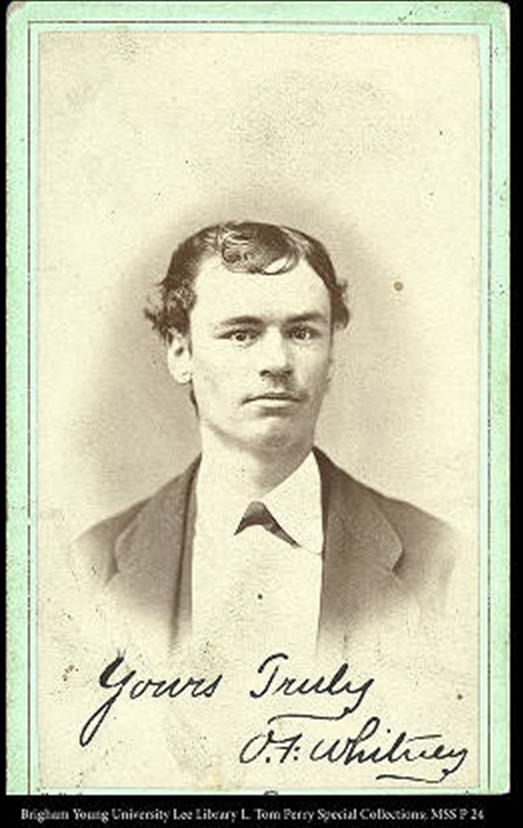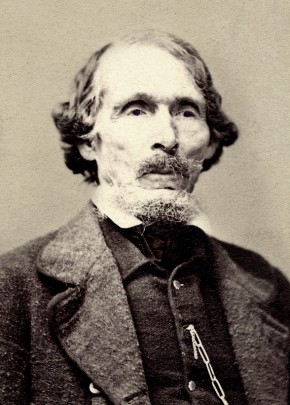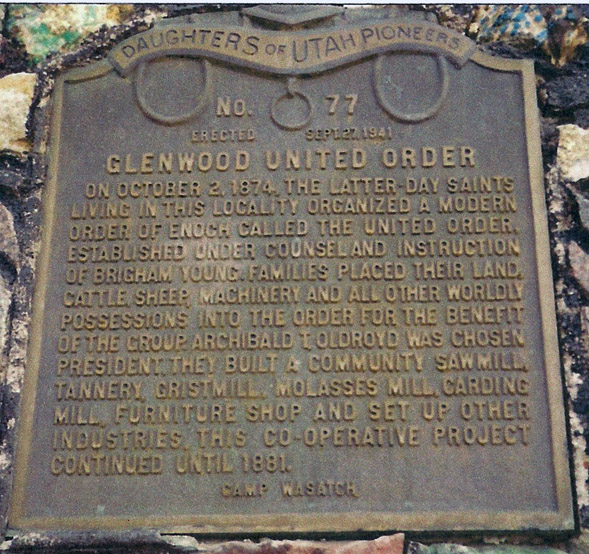-
•
•
While eclipsed by the Iron Rod imagery in Nephi, the Olive Tree imagery in Jacob is still well-known and referred to frequently. Like so much of Mormon theology, it attempts to give an explanation for the whole swath of human history and show that we are in the last days. Since both images are unique to the Book of Mormon, they are only found in Mormon sources. The earliest use of the Olive Tree imagery in literature is from Parley P. Pratt, who included it in his poem, Historical Sketch from the Creation to the Present Day. This poem was… Read More
-
•
•
19 responses
-
•
•
33 responses

Not too long ago, Ben and Jerry’s opened a new front in the culture wars by temporarily renaming its “Chubby Hubby” flavor as “Hubby Hubby” and highlighting this chilling act on their website. And now they’re at it again. I’m guessing that at some point the Church will respond with its own renamed flavor, which is where your collective wisdom is required. Here is a list of Ben and Jerry’s flavors. The best I could come up with is renaming Triple Caramel Chunk as Triple Temple Dunk. But I’m sure you can do better. Read More
-
•
•
79 responses

Joanna Brooks is the Chair of the Department of English and Comparative Literature at San Diego State University. She is the author of several books, most recently The Book of Mormon Girl: Stories From an American Faith (2012). The book is available at Amazon and at the author’s website. A short couple of hundred pages, the book is at various turns both enjoyable and troubling, as the author recounts growing up LDS in Southern California, informally leaving the LDS Church then returning to activity, then rather suddenly emerging as a leading voice of what might be termed the progressive Mormon… Read More
-
•
•
7 responses

(I’m jumping because of the Bott stuff, but will still put up my 2 posts on Genesis 2-4 and Creation/temples post.) Instead of beginning on the Flood on Thursday as planned, I decided to take 5 minutes to talk about the mark of Cain in Genesis 4, and the curse on Canaan in Genesis 9. We never got to the flood, but ended up having a wonderful (I think) 2.5+ hour conversation about the priesthood ban, the eisegesis and various theories it engendered, the role and fuzzy definitions of tradition, policy, and doctrine in the Church. We also covered related… Read More
-
•
•
30 responses
It occurred to me the other day when I read Givens’ beautiful description of why we perform ordinances for the dead that our response to some critics of the practice of posthumous baptism may be too defensive. In response to those who believe that baptism or some other ordinance or event is required to enter God’s Kingdom, shouldn’t we go on the offensive and ask them what they are doing about those who were never baptized? Near as I can tell, hundreds of millions, if not billions, of humans have died without even having heard the gospel of any western… Read More
-
•
•
24 responses

An unscientific poll: (Poll inspiration here.) Read More
-
•
•
4 responses

A major element of Jacob’s sermon in Jacob 2 is his condemnation of pride and those caught up in their riches. In that sermon, Jacob not only preaches against pride, but argues for equality, saying “Think of your brethren like unto yourselves, and be familiar with all and free with your substance, that they may be rich like unto you.”(2:17) and adding “one being is as precious in His sight as the other.” While Jacob likely lived too early in Nephite history for inherited classes to develop, still these views seem to clearly argue against classes and social hierarchy. Read More
-
•
•
3 responses
-
•
•
44 responses
And it’s in the news again. We have Elie Wiesel’s name slated for baptism, baptisms performed for Nazi-hunter Simon Wiesenthal’s parents, baptism performed for Anne Frank (for the ninth time!), baptism performed for Daniel Pearl (who was killed in part, at least, because he was Jewish), and baptism performed for Gandhi. This in spite of the Church’s agreement (in 1995!) to remove Holocaust victims from the database.[fn1] And, apparently, the Church has now sent out a strongly-worded letter to be read in Sacrament meetings.[fn2] In the letter, the Church (strongly) reiterates the prohibition on submitting celebrity and Holocaust victim names,… Read More
-
•
•
17 responses
I will intentionally ignore the larger context in which chapter 7 of The Attributes of God appears—namely, an attempt to nail down the nature, according to the Mormon conception, of divine omniscience. I’ll focus more narrowly on just what Ostler has to say about agency. I think the larger concerns here are important, but we have some weeks yet in which to take up his conclusions. Late in chapter 7, Ostler begins to speak of emergence. I think this is the right term, but not, I think, in the way Ostler uses it. I want to talk about agency itself—in… Read More
-
•
•
8 responses

(We’re a few weeks behind here on the blog. I hope to catch up. Most important for my students: We WILL have Institute this week, contrary to what I said last Thursday.) Tonight we finished off Genesis 1 and introduced the second creation account in Gen 2. Had a few more people, so I started by recapping Walton’s theory of functional creation (references in previous post.) Seven days It’s long been noticed that days 1-3 parallel days 4-6. Walton argues that days 1-3 create three primary and basic functions, while 4-6 create functionaries that either carry out those functions, or… Read More
-
•
•
112 responses
Recent and highly public events have focused attention on the prevalence of “folklore” — church members, sometimes in positions of authority, “freelancing” beyond church doctrine. Of course, there are a variety of complicated issues in trying to sort out doctrine from folklore, which l’affaire Bott cast into sharp relief. There have been recriminations and hurt feelings, and the community will likely be dealing with the fallout for some time to come. But we do have a few silver linings. For instance, the church newsroom’s prompt and unequivocal condemnation of Bott’s statements likely means that highly-visible BYU professors will think twice… Read More
-
•
•
93 responses
It has been only one week since the initial Washington Post article quoting BYU Professor Randy Bott’s controversial statements was published. [See Kent’s very helpful ongoing chronology of events and published stories.] But a week is a lifetime online. While official and unofficial reactions will continue to play out over coming weeks and months, we can already see who the winners and losers are among the main players. Briefly, the winners are the LDS Church, LDS Public Affairs, LDS bloggers and columnists, the mainstream media, and the rank and file members of the Church. The losers are BYU and the… Read More
-
•
•

In Nephi’s final writings (2 Ne. 31, discussed in Book of Mormon Gospel Doctrine lesson 11) he teaches about the “doctrine of Christ,” focusing on Christ’s baptism and redemption of the world from sin and on urging his readers to “endure to the end.” This doctrine is the heart of the gospel, the key element of the plan of salvation and eternal progress. Which makes the following poem fit well with the lesson. I only wish that the poem also somehow mentioned baptism. Read More
-
•
•
-
•
•
19 responses
Following “Exploring Mormon Conceptions of the Apostasy,” a conference organized by Miranda Wilcox and held this last Thursday and Friday at BYU, I heard several people say that it was the best conference of any kind they had ever participated in. I don’t think that was merely a polite exaggeration. Read More
-
•
•
48 responses
![The Bott Gaffe: A Chronology [Updated 6Mar12 9:45p]](https://timesandseasons.org/wp-content/uploads/2012/03/randybott.jpg)
Since Wednesday, when I read the Washington Post article that cited BYU Professor Randy Bott, I have been surprised at two elements of the news and commentary I’ve read about it. First, I’ve been pleasantly surprised at the unanimity of the response—no one that I’ve seen has tried to defend the ideas that Bott expressed. Second, I’ve been surprised at the speed of the official response. If it is possible, the response makes the views expressed by Bott seem anachronistic to Mormonism today. And I hope this response will make clear to those who still maintain some version of these… Read More
-
•
•
16 responses
I finished up my month of jury duty last fall. Yes, you read that right: a month of jury duty. As things settled back to my usual craziness, I decided that I was rather disturbed by my behavior. Read More
-
•
•
6 responses

Is there a set of all sets? This is one way of asking that most basic of all metaphysical questions: is the world “one” or “many”? For traditional Christian thinking, the difference between the world being one or many was simply the difference between Christianity and paganism. Joseph Smith’s assertion that we are uncreated and coeternal with God hits the metaphysical reset button and forces us to look at this question again. Read More
-
•
•
121 responses
[Update 2:] The Church has responded, both with respect to Dr. Bott’s statement and with a statement on the Church and race. I’m adding the text of each to the bottom of the post, but I want to highlight these two excerpts: We condemn racism, including any and all past racism by individuals both inside and outside the Church. The origins of priesthood availability are not entirely clear. Some explanations with respect to this matter were made in the absence of direct revelation and references to these explanations are sometimes cited in publications. These previous personal statements do not represent… Read More
-
•
•
12 responses
(See here for Jim’s original post, here for part I, and here for part II) In my original response to Jim, I wrote the following: While I’ve tried to be fair and accurate, it may be that I’m misreading [Toscano or Faulconer], that I’m mistaken in my analysis of their position. Even if that turns out to be the case, I believe that explicitly laying out this Toscano-Faulconer spectrum is a very useful tool, one that helps us all to orient ourselves to the various possibilities that exist for intellectuals, and allows me to argue in favor of a third… Read More
-
•
•
4 responses

Perhaps the most common theme in early Mormon poetry is the restoration. But while the Book of Mormon itself prophesies about the restoration (as it does in the 10th Book of Mormon lesson), it wasn’t until this hymn was published in 1833 that Mormon poetry addressed the subject. Of course, soon after the Restoration became a very common theme in Mormon poetry from many authors. William Wines Phelps, the author of this hymn was also one of the first and most prolific of Mormon poets, although unlike his contemporaries Parley P. Pratt, Eliza R. Snow and John Lyon, Phelps never… Read More
-
•
•
2 responses
-
•
•
One response
I had previously intended to post some of Jim’s comments from an email. Instead, I’m re-posting his response to Part I here in order to further highlight what he has to say. I’ll follow this up with one more post tomorrow. Jim’s comments are as follows: I cannot tell you how touched and flattered I am by your piece, both by the kind things you say in the beginning and by the very fact that you’ve thought something I wrote worthy of such a careful, thoughtful response. My response to your essay is that I disagree with almost nothing. I think there… Read More
-
•
•
39 responses
I disagree with some important parts of Jim’s recent piece on intellectuals in the Church (please read what he said first). By the end, I hope it’s clear that it is (in part) for “Faulconerian” reasons that I disagree with him. To begin, I’m going to indulge in a bit of biographical narcissism in order to make a point about the nature of my disagreement. The semester recently began, and as I do at the beginning of nearly every course, I told the students a story about Jim Faulconer, or rather about my undergraduate self in one of Jim’s classes.… Read More
-
•
•
5 responses
Previously appearing on Times and Seasons: Part I: A tentative theory – the copyists for the printer’s manuscript didn’t work quickly enough. Part II: Rejecting the theory. * * * In January of 1830, Abner Cole illegally published three excerpts from the Book of Mormon, printed in three issues of The Palmyra Reflector, including a section from Alma 43, published on 22 January 1830. Read More
-
•
•
9 responses
Most of what is given is never received. Most of what is possible goes unrealized. And many feet never find a shoe. True, life presses on (except when it doesn’t). But when it moves, it moves in fits and false starts and, just like Darwin said, most of its spendthrift variations end up serving no end in particular. Call this surplus the bootless. Read More
-
•
•
3 responses
Previously appearing on Times and Seasons: Part I: A tentative theory – the copyists for the printer’s manuscript didn’t work quickly enough * * * One important question for this scenario is: Why did the copyists do that part of P that they supposedly fell behind in producing? Read More

